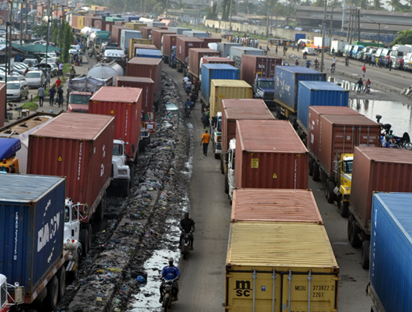The Minister of Works, Housing and Power, Babatunde Fashola, has asked a Federal High Court sitting in Lagos to dismiss the fundamental right suit filed by human rights lawyer, Femi Falana (SAN), challenging the failure of the Federal Government to address the gridlock on the Apapa-Oshodi expressway.
A counter-affidavit deposed to by one Ayodele Otedola, a litigation clerk at the Ministry on behalf of the Minister, noted that the gridlock on the road “is always caused by tanker drivers who normally follow the route to NPA for the purpose of loading and offloading their goods” and that the Minister’s “effort to clear the road and remove the trailers and tankers has not been easy but that effort has been redoubled to achieve this goal”.
In his preliminary objection against the suit, Fashola contended that the failure to repair the road has not in any way restricted or breached Falana’s freedom of movement. He also challenged Falana’s locus standi to file the suit, since he has not shown that he has suffered over and above other motorists or people who use the road.
In the suit, Falana argued that the state of the road constitutes a threat to his life and violation of his fundamental right to move freely in Lagos guaranteed by Sections 33 and 41 of the Constitution of the Federal Republic of Nigeria, 1999 as amended and Articles 5 and 12 of the African Charter on Human and Peoples’ Rights (Ratification and Enforcement) Act.
In the substantive case, the rights lawyer is also seeking the following reliefs a declaration that the refusal or failure of the respondents to remove obstructions, repair and maintain the Oshodi-Apapa Expressway is illegal and unconstitutional as it constitutes a threat to the fundamental right to life of the applicant guaranteed by Section 33 of the Constitution of the Federal Republic of Nigeria, 1999 as amended and Article 4 of the African Charter on Human and Peoples’ Rights (Ratification and Enforcement) Act (CAP A9) Laws of the Federation of Nigeria, 2004.
“A declaration that the failure or refusal of the respondents to make the Oshodi-Apapa Expressway safe for motorists is illegal and unconstitutional as it violates the applicant’s fundamental right to freedom of movement guaranteed by Section 41 of the Constitution of the Federal Republic of Nigeria, 1999 as amended and Article 12 of the African Charter on Human and Peoples’ Rights (Ratification and Enforcement) Act (CAP A9) Laws of the Federation of Nigeria, 2004.
“A declaration that the parking of tankers and trailers on the overhead bridges in Lagos is illegal and unconstitutional as it constitutes a threat to the fundamental right to life of the applicant and other motorists guaranteed by Section 33 of the Constitution of the Federal Republic of Nigeria, 1999 as amended and Article 4 of the African Charter on Human and Peoples’ Rights (Ratification and Enforcement) Act (CAP A9) Laws of the Federation of Nigeria, 2004.
“A declaration that the applicant is entitled to his fundamental right to economic, social and cultural development guaranteed by Article 22 of the African Charter on Human and Peoples’ Rights (Ratification and Enforcement) Act (Cap A9) Laws of the Federation of Nigeria, 2004.
“An order directing the respondents to remove all obstructions, repair and maintain the Oshodi-Apapa Expressway forthwith.”
The Federal High Court has fixed January 19, 2018 for hearing the substantive suit and the preliminary objection.
Copyright Ships & Ports Ltd. Permission to use quotations from this article is granted subject to appropriate credit given to www.shipsandports.com.ng as the source.
